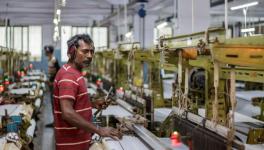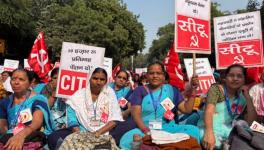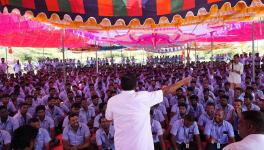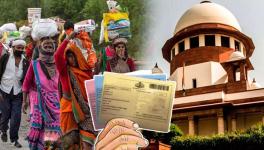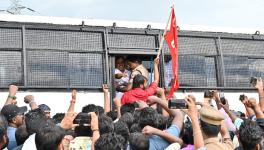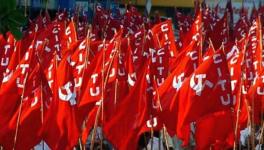Modi-Made Disaster to Destroy the Indian Working Class
Demonetisation’s impact on the Indian working class has been devastating, particularly on the unorganised workers. The micro and mini industries have either already closed or on the brink of shutting down. Since most workers in the unorganised sector are migrant workers, they are not able open bank accounts and they need liquid cash for day to day transactions. There is a ‘reverse migration’ due to lack of cash. Apart from the fact that only 47% of Indians hold bank accounts, the picture of a digitalized India is a far-fetched dream, as there is no infrastructure to make it possible. Not only that the GDP is slowing down due to demonetisation, but inequalities are also growing. Small scale industries and traders will lose while the big fat private players take the cake. Thumbnail Image Courtesy: DailyO
Rough Transcript:
Pranjal: Hello and Welcome to Newsclick. Today we are joined by K. Hemalata who is president of all India for Center for Trade Unions and we are going to discuss about demonetisation and its impact on the Indian working class. Welcome to Newsclick. So, the demonetisation (process) has been there for last two months almost. What’s its impact on the Indian working class?
K. Hemlata: The impact on the Indian working class has been devastating, particularly on the unorganised workers. We are having reports that thousands of small industries, particularly the micro, mini and small industries, and the medium industries also, have either closed down or they’re not able to pay their workers in cash. And because the workers, most of them are migrant workers, they’re not able to open the bank accounts; they don’t have the bank accounts and most of them are illiterate and they need cash for their day-to-day requirements. And the owners are not able to pay them in cash. So because of that, the industries have closed and the workers are migrating back and there is reportedly a ‘Reverse Migration’ what we call. So, workers are going back because they are not able to sustain their lives in the cities, they’re going back to their villages.
Pranjal: But the government has also been claiming that ‘we are opening Jan-Dhan accounts and through that, workers can take their money’. So, this entire process of digitalization that they are pushing, do you find it feasible?
Hemlata: No we don’t think (it’s) feasible because, one, is that even today around 35% of the country is not covered by banks. Then the electricity, then the networking of the internet, they are not available. Even in Delhi, what we find in the reports (is) that the migrant workers don’t have bank accounts and even when now they’re going to have the bank accounts, the bankers are not willing to open the accounts because they don’t have the necessary documents, the identity cards. They were saying that the identity cards you have, they are from your state so they want address from here which they don’t have. So that is one aspect. The other thing is we came to know about a domestic worker, who was saving some Rs. 10,000 in Rs. 1,000 notes. She had a Jan-dhan account which is a zero balance account. When she went to deposit that amount in the bank, they refused. They said it was black money so they didn’t accept (it). So these are very different types of problems faced by workers and because of this, we don’t think it’s feasible at this juncture a digitalized economy and to force the other thing is, cashless economy.
Pranjal: So, do you think there has been any specific section in the working class that has been more impacted due to demonetisation. For example, most of the unorganised sector also has women participation in it. So, will it have any impact on them?
Hemlata: Yes definitely, unorganised sector workers are the most impacted and the migrant workers. The brick industry, in the construction industry, in the textile, garments etc. So even in the engineering industry, steel industry in Delhi. So migrant workers are the most affected, unorganised sector workers are most affected and naturally women, who are large part of the unorganised section of workers, they are also affected and they are the ones responsible to feed their families. It’s very difficult for them even to buy the necessary things. So women are also as part of the unorganised sector, they are also very much impacted by this.
Pranjal: So recently this organisation of Indian manufacturers that had come out with a report giving stats that how there’s a large chunk of manufacturing units that have closed down. What do you have to say on that?
Hemlata: We agree with that report. They say that 35% job losses have been there and they say that up to March, it is going to increase to 40%-45%. And the losses to the industry were also revenue. Dip was also around 50%, they say it is also going to increase. And all the reports, from different quarters, the automobile sales have come down, the purchasing capacity, and even in Gujarat there was a report that dairy farmers, they were not able to get the money. So (for) different quarters, it is the same.
Pranjal: So, the Center for Trade Union has been fighting on this issue for long. There was a nationwide strike call on 2nd September; you had a charter of demands. How do you plan to pursue it further when we have seen demonetisation and its impact?
Hemlata: So actually on November 28th, when the left parties gave a call, we were in our conference, the 15th conference which was in Puri. On that day itself, all the over 2000 delegates, we held a human chain and demanded that worker should be paid in cash, till the new currency notes are made available, old currency notes should be accepted. That was at that time. Then after coming from our conference, we had a meeting with the Kisan Sabha and Agricultural Workers Union. And this 19th, we are having an all India program where the three organisations, the CITU, All India Kisan Sabha and the Agricultural Workers Union, we are holding demonstrations at the district level demanding that there should be compensation for the job losses, for the wage losses and the crop losses. Because it’s not only the workers, even the peasants are suffering. In many places we are seeing that the farmers, they are not able to sell their produce and they’re throwing their tomatoes, their potatoes and some places we have received reports. In Chhattisgarh, there they were distributing free all these things. So, altogether we are having this on these demands and also because of the reverse migration, the demand for MNREGA work that has increased. Around 60% or more it has increased it is said. So we are demanding that the allotment for MNREGA, that should be increased and the workers should be paid and given jobs on MNREGA. Other demands that we are having is loan waiver for the farmers. So these demands we are organizing. And yesterday, all the trade unions, central trade unions, we met in INTUC office (Indian National Trade Union Congress) and we also, from the joint trade union platform, we have decided to organise demonstrations on 28th of this month, in January, all over the country.
Pranjal: So, when you talk about the joint trade unions, is BMS also a part of it, because if you look at the 2nd September strike, BMS withdrew at the last moment.
Hemlata: No this time it was not part at all. In 2015, it withdrew in the last moment. But in 2016, from the beginning it was not part of the strike call. But, in case of demonetisation also, initially they welcomed, they said that it is a good move and it is good. But later on thy changed their statement, they said that it is leading to job losses and they don’t believe that it is useful in unearthing black money. Workers were facing difficulties, the intention was good but it was not implemented properly. But anyway they are not part of this; they did not come to this. So the other trade unions have given this call.
Pranjal: This would be my last question. If you look at the Indian economy and the model of neo-liberalism it had followed for last many years, it has resulted in growing inequalities in the economy. And once this demonetisation comes, what will happen to the economy? We have already seen the figures that GDP is coming down.
Hemlata: Yeah, GDP is coming down that is one aspect. But as you said, the inequalities are also growing. What we see is that this entire measure, see first when they started they said that it was meant to unearth black money and corruption, funding for terrorism, counterfeit notes etc. But later on the entire narrative changed. Now they’re not talking about this. The thing is that digital economy, cashless economy, all these things. So entire exercise as we see it is only meant to benefit the international finance, finance capital. All the money has been mopped up into the banks. So the banks were facing this question of MPAs, now again they will be able to loan to the big corporates, provide credit for them but the people will be suffering. And the other thing is the IT companies, they will benefit. The Paytm etc, they have given big advertisements and all these things. So, the inequalities are bound to increase. The small traders, small business, they’re all going to lose. So, definitely in the coming period the inequalities are going to increase.
Pranjal: Thanks a lot for giving us your time and as these things proceed we’ll be coming back to on such issues.
Hemlata: Thank you.
Pranjal: Thank you for watching Newsclick.
DISCLAIMER: Please note that transcripts for Newsclick are typed from a recording of the program. Newsclick cannot guarantee their complete accuracy.
Get the latest reports & analysis with people's perspective on Protests, movements & deep analytical videos, discussions of the current affairs in your Telegram app. Subscribe to NewsClick's Telegram channel & get Real-Time updates on stories, as they get published on our website.










